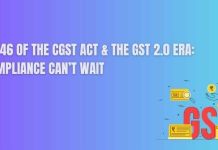GST (Goods and Services Tax) is a unified indirect tax system that has been implemented in India since 1st July 2017. It has replaced several indirect taxes such as excise duty, service tax, VAT, etc. The GST system has simplified the tax structure and increased transparency in the tax system. The GST accounting system is crucial for businesses to ensure compliance with the tax regulations and to avoid penalties.
In Rajasthan, the GST accounting system is governed by the Rajasthan State Goods and Services Tax Act, 2017, and the Central Goods and Services Tax Act, 2017. Every business with an annual turnover of more than Rs. 20 lakhs (Rs. 10 lakhs for the northeastern states) is required to register under the GST system.
Here are some key aspects of GST accounting in Rajasthan:
GST Registration: Every business entity in Rajasthan has to register for GST before conducting any business operations. GST registration can be done online by visiting the GST portal. Once registered, a unique Goods and Services Tax Identification Number (GSTIN) is issued, which is used for all future transactions.
GST Returns: Under the GST system, businesses are required to file regular returns with the GST authorities. There are three types of GST returns: GSTR-1 (for sales), GSTR-2 (for purchases), and GSTR-3 (for monthly returns). In addition, there are annual returns (GSTR-9) and a reconciliation statement (GSTR-9C) that need to be filed.
GST Invoice: Every business in Rajasthan has to issue a GST invoice for all transactions. The GST invoice should contain the GSTIN of the supplier and the recipient, a description of the goods or services supplied, the value of the transaction, and the applicable GST rate.
Input Tax Credit: Input Tax Credit (ITC) is a mechanism that allows businesses to claim credit for the GST paid on purchases. Businesses can claim ITC on the GST paid on goods and services used for business purposes. The ITC claimed can be used to offset the GST liability on sales.
GST Payment: The GST liability has to be paid by the due date, which is usually the 20th of every month. The GST payment can be made online through the GST portal or through authorized banks.
Apart from the above-mentioned aspects, there are some additional points to consider for GST accounting in Rajasthan:
Composition Scheme: The Composition Scheme is a simplified tax scheme for small businesses with an annual turnover of up to Rs. 1.5 crores. Under this scheme, businesses can pay tax at a lower rate and have fewer compliance requirements. However, businesses under this scheme cannot claim ITC and have to file quarterly returns instead of monthly returns.
E-way Bill: E-way Bill is an electronic document that has to be generated for the movement of goods worth more than Rs. 50,000. The e-way bill contains details such as the GSTIN of the supplier and recipient, the description of goods, the value of goods, and the transporter’s details. E-way bills can be generated online through the GST portal.
Reverse Charge Mechanism: Under the Reverse Charge Mechanism, the liability to pay GST is shifted from the supplier to the recipient of goods or services. This mechanism is applicable for specific transactions such as services received from an unregistered supplier or the purchase of certain goods from an unregistered dealer.
Audits: GST audits are conducted by the GST authorities to verify the accuracy of the GST returns filed by businesses. The audit can be either a desk audit or a physical audit. Businesses with an annual turnover of more than Rs. 5 crores are required to undergo a GST audit every year.
Penalties: Non-compliance with the GST regulations can result in penalties and legal action. Penalties can be imposed for late filing of returns, non-filing of returns, incorrect GST invoices, etc.
GST Refunds: Businesses can claim refunds for the GST paid on exports or on input services used for exports. The refund application has to be filed online through the GST portal. Refunds can also be claimed for excess GST paid due to a clerical or computational error.
Input Service Distributor: An Input Service Distributor (ISD) is a business that receives invoices for input services used by multiple branches or divisions of the same business. The ISD can distribute the credit of the GST paid on input services to the branches or divisions in proportion to their usage. The ISD has to file monthly returns containing the details of input services distributed and the GST credit distributed.
GST on Imports: GST is applicable on imports of goods and services into India. The GST has to be paid at the time of import, and an IGST (Integrated Goods and Services Tax) invoice has to be issued. Businesses can claim ITC on the GST paid on imports.
Place of Supply: The Place of Supply determines the state in which the GST has to be paid. The Place of Supply is based on the location of the supplier and the recipient and the type of transaction. The Place of Supply rules are important to determine the correct GST rate and to ensure compliance with the GST regulations.
GST Council: The GST system is governed by the GST Council, which is composed of representatives from the central and state governments. The GST Council meets regularly to make decisions on the GST rates, exemptions, and other policy matters related to the GST system.
Conclusion
GST accounting in Rajasthan requires businesses to maintain accurate records of their transactions and comply with the GST regulations. Businesses can benefit from seeking the guidance of a professional accountant to ensure compliance and avoid penalties. The GST system has simplified the tax structure and increased transparency in the tax system, making it easier for businesses to conduct their operations.
Other Related Blogs: Section 144B Income Tax Act






